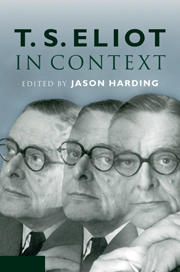Book contents
- Frontmatter
- Contents
- List of illustrations
- List of contributors
- Acknowledgements
- List of abbreviations
- Introduction
- PART ONE LIFE
- PART TWO FORMS
- 7 The role of intellectual
- 8 Publishing
- 9 Censorship
- 10 Literary journalism
- 11 Visual art
- 12 Dance
- 13 Drama
- 14 Music
- 15 Radio
- PART THREE LITERARY CROSS-CURRENTS
- PART FOUR POLITICS, SOCIETY AND CULTURE
- PART FIVE RECEPTION
- Further reading
- Index
9 - Censorship
Published online by Cambridge University Press: 05 August 2012
- Frontmatter
- Contents
- List of illustrations
- List of contributors
- Acknowledgements
- List of abbreviations
- Introduction
- PART ONE LIFE
- PART TWO FORMS
- 7 The role of intellectual
- 8 Publishing
- 9 Censorship
- 10 Literary journalism
- 11 Visual art
- 12 Dance
- 13 Drama
- 14 Music
- 15 Radio
- PART THREE LITERARY CROSS-CURRENTS
- PART FOUR POLITICS, SOCIETY AND CULTURE
- PART FIVE RECEPTION
- Further reading
- Index
Summary
T. S. Eliot worked in a context of heavy literary censorship. The conflict between literature and the law reached its peak in 1921, when a New York court decided to prevent the American public from reading James Joyce's Ulysses. Alongside the famous obscenity trials of D. H. Lawrence's The Rainbow in 1915, Ulysses in 1921, and Radclyffe Hall's The Well of Loneliness in 1928, there were also less famous and institutionalised kinds of censorship, which worked to control the dissemination of texts. Alfred Kreymborg's rather mild short story about a prostitute, Edna: The Girl of the Street, was seized by the New York police in 1916. The same year, Ezra Pound was told by the British publisher Elkin Mathews to omit four poems from Lustra because the printer objected to their salacious content. Copies of the magazine the Little Review containing Wyndham Lewis's short story ‘Cantleman's Spring Mate’ were stopped by a New York postman in 1917. Djuna Barnes was forced by her American publisher Horace Liveright to alter the text of Ryder in 1928. In 1937, Boots's circulating library refused a book by Wyndham Lewis simply because the title, False Bottoms, was considered too vulgar. The hard-up Lewis dutifully changed the title to The Revenge for Love.
In addition to these British and American policemen, printers, postmen, customs officers, publishers and circulating libraries, authors also had to contend with the censoring sensibilities of private individuals.
Information
- Type
- Chapter
- Information
- T. S. Eliot in Context , pp. 83 - 92Publisher: Cambridge University PressPrint publication year: 2011
